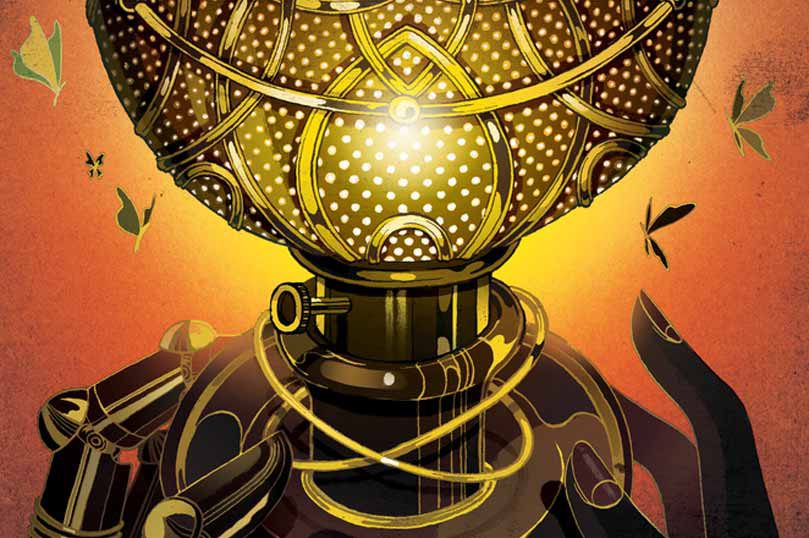 Everfair is a wonderful Neo-Victorian alternate history novel that explores the question of what might have come of Belgium’s disastrous colonization of the Congo if the native populations had learned about steam technology a bit earlier. Fabian Socialists from Great Britain join forces with African-American missionaries to purchase land from the Belgian Congo’s “owner,” King Leopold II. This land, named Everfair, is set aside as a safe haven, an imaginary Utopia for native populations of the Congo as well as escaped slaves returning from America and other places where African natives were being mistreated.
Everfair is a wonderful Neo-Victorian alternate history novel that explores the question of what might have come of Belgium’s disastrous colonization of the Congo if the native populations had learned about steam technology a bit earlier. Fabian Socialists from Great Britain join forces with African-American missionaries to purchase land from the Belgian Congo’s “owner,” King Leopold II. This land, named Everfair, is set aside as a safe haven, an imaginary Utopia for native populations of the Congo as well as escaped slaves returning from America and other places where African natives were being mistreated.
Nisi Shawl’s speculative masterpiece manages to turn one of the worst human rights disasters on record into a marvelous and exciting exploration of the possibilities inherent in a turn of history. Everfair is told from a multiplicity of voices: Africans, Europeans, East Asians, and African Americans in complex relationships with one another, in a compelling range of voices that have historically been silenced. Everfair is not only a beautiful book but an educational and inspiring one that will give the reader new insight into an often ignored period of history.
Everfair will be available on September 6th. Please enjoy this excerpt.
Burgundy, France, July 1889
Lisette Toutournier sighed. She breathed in again, out, in, the marvelous air smelling of crushed stems, green blood bruised and roused by her progress along this narrow forest path. Her progress, and that of her new mechanical friend. Commencing to walk again, she pushed it along through underbrush and creepers, woodbine and fern giving way before its wheels. Oh, how the insects buzzed about her exposed skin, her face and hands and wrists and ankles, waiting to bite. And the vexing heat bid fair to stifle her as she climbed the hillside slowly—but the scent—intoxicating! And soon, so soon, all this effort would be repaid.
There! The crest came in sight, the washed-out summer sky showing itself through the beech trees’ old silver trunks. Now her path connected with the road, stony, rutted, but still better suited for riding. She stood a moment admiring the view: the valley, the blurred rows of cultivation curving away smaller and smaller in the bluing distance, the sky pale overhead, the perfect foil for the dark-leaved woods behind her and by her sides. Not far off a redwing sang, cold water trickling uphill.
She had the way of it now: gripping the rubber molded around the machine’s metal handlebars, she leaned it toward her and swung one skirted leg over the drop frame. Upright again, she walked it a few more steps forward, aiming straight along the lane, the yellow-brown dust bright in the sun. The machine’s glossy paint shone. Within the wheel’s front rim its spokes were a revolving web of intricacy, shadows and light chasing one another. Tiny puffs of dust spurted from beneath the black rubber tires.
She raised her eyes. The vista opened wider, wider. The road laid itself down before her.
Up on the creaking leather seat. Legs drawn high, boots searching, scraping, finding their places . . . and pedal! Push! Feet turning circles like her machine’s wheels, with those wheels. It was, at first, work. She pedaled and steered, wobbling just once and catching herself. Then going faster, faster! Flying! Freedom!
Saplings, walls, and vines whipped by, flashes of greenbrowngreengrey as Lisette on her machine sped down the road, down the hill. Wind rushed into her face, whistled in her ears, filled her nose, her lungs, tore her hair loose of its pins to stream behind her. She was a wild thing, laughing, jouncing over dry watercourses, hanging on for dear, dear life. Lower, now, and some few trees arched above, alternately blocking the hot glare and exposing her to it coolwarmcoolwarm, currents of sun and shade splashing over her as she careened by. Coasting, at last, spilling all velocity till she and the machine came to rest beside the river.
The river. The comforting smell and sound of it rushing away. Out on the Yonne’s broad darkness a barge sailed, bound perhaps for Paris, the Seine, the sea beyond, carrying casks of wine and other valuables. Flushed from her ride, Lisette blushed yet more deeply, suddenly conscious of the curious stares of those around her: Ma de moi selle Carduner, the schoolmistress; and Monsieur Lutterayne, the chemist, out for a promenade during his dinner hour or on some errand, seizing a chance to vacate his stuffy shop. Flustered, she attempted to restrain her hair into a proper chignon, but at only sixteen and with many pins missing, this was beyond her skill. She began furiously to plait her thick blond curls, and the others moved away.
At last she was alone on the riverbank with her mechanical friend. She tied her plaits together, though she knew that momentarily they would slither apart. She stroked the machine’s stillgleaming handlebars, then leaned to fi t her forehead at their center, so. “Dear one,” whispered Lisette. “How can you ever know how much you mean to me? Who would not give all they could, everything they had, in exchange for such happiness as I have found with you?”
Sans words, the front tire’s black arc responded to her whispers with visions. It preached to her of motion, of travel, of the mysteries dwelling beyond this sleepy, provincial village.
“Ah, yes, and one day, my dear, one day . . .” She raised her head and gazed out again at the river, at the barge now nearly gone from view. “One day we shall venture out and see for ourselves what it is the world holds for us.”
Boma, Congo, December 1889
Horror.
The Reverend Lieutenant Thomas Jefferson Wilson could think of no other word to sum up what he had experienced on this trip. Even now, alone in the quiet, white- walled room provided him by his host, he heard their cries, he saw their wasted bodies, their eyes bulging large in their thin faces, pulsing with defeat, hopeless as marine creatures stranded on a desolate beach. He smelled them, their sores running with blood and infected matter where chafed by their chains at neck and wrist and waist and ankle. Smelled the sweat of their fear, the fear that made them lift up and carry burdens half their malnourished weight till released by death. Smelled their abundant corpses rotting by the trail in the tropic heat.
This land was to have been Heaven.
Restless as ever, he abandoned his seat on the narrow cot to unshutter the room’s one window. A breeze brought some relief from the day’s fierce temperatures. Even up here, on the capital’s plateau, a Pennsylvanian such as himself found the Congo “ Free” State’s equatorial climate hard to withstand. But he should not complain.
Or not on his own behalf.
A tapping at the door. He opened it on a child of eleven, the house hold’s primary servant— a boy named Mola, he recalled. “ ’Soir,” the boy slurred in French. He entered, bearing with him
a tray, the meal his master offered in lieu of the repast shared by Boma’s white residents at the hotel near the river below.
The Reverend Lieutenant Thomas Jefferson Wilson would not be welcome at that hotel, for he was not white.
The dishes on the tray held vegetables, the ever-present manioc, and stewed meat of some sort—probably from a fowl or goat. No doubt this was what Mola himself would sup upon, and Thomas made sure to tender the boy his thanks as effusively as his limited French allowed. When he was alone again he placed the tray beneath his cot, the food untouched. His journey upriver to Stanley Falls and then back here to the port of Boma had entirely wrecked his appetite.
The wine he also set aside, to aid him later in seeking sleep. He drank instead a gobletful of water from a crystal decanter, then set that on the sill to cool and turned again to his work.
To the horror.
At forty a veteran of three wars, Thomas had seen and survived much. Though no more than a child at the American Civil War’s onset, as soon as blacks were allowed to fight he had enlisted and seen action. That must be why his sojourn here in the Congo was affecting him so adversely, he told himself sternly. His reaction was not illness, not pain and anguish, but anger: righteous indignation that the evils of slavery, which he had staked his life to eradicate from the face of the Earth, had sprung up once again. Unprotested and, what was worse, unremarked, they had met him everywhere he journeyed in this supposed Utopia.
A pair of thin pillows lay over his traveling desk, incompletely concealing it. He retrieved it and drew forth the manuscript of his open letter to King Leopold, monarch of this realm and soi-disant benefactor of its benighted native population.
“Good and great friend,” the salutation read. “I have the honor to submit for your Majesty’s consideration some reflections respecting the Independent State of Congo, based upon a careful study and inspection of the country. . . .” So far, he had written five pages and not yet named a third of the atrocities he had been forced to witness. The whippings, the murders committed so casually as if a form of sport, innocents dismembered—Thomas’s gorge rose, but he settled nonetheless to his self- appointed task.
Keeping his intended audience in mind, he aimed for a tone of forthrightness that yet maintained discreet silence on the more repulsive details of what he had discovered. The open letter would
be published in his paper, The Commoner, and also as a standalone pamphlet; perhaps in boards as a small book, on the Continent. There he would find support for such an enterprise, translators. . .
The light dimmed rapidly, but not till he heard the clattering ratchet of the steam- driven trolley climbing Boma’s cliffs did Thomas cease his efforts. That noise, he knew, presaged the arrival of his host, the Anglo- Flemish trader Roger Morel. Thomas didn’t trust him, didn’t trust anyone who profited from Leopold’s reign. He packed away his open letter and went to meet the trolley at the platform mere yards from Morel’s villa.
Four cars comprised the steam train’s entire length. Their iron fuselages had been painted a brilliant yellow with gaudy red, blue, and green trim. This jaunty coloring and the fortuitous semblance of a face in the alignment of their doors and windows lent the cars a charming air much like the illustration in a children’s book. Thomas at first had succumbed to this charm and to the undeniable romance of such a small machine so beautifully built—until his peregrinations brought home to him the human cost involved.
Beneath the leafy serrations of a grove of palms the cars disgorged themselves of their riders, black- clad white men replacing their hats and stepping carefully down the platform’s wooden stairway. Morel bared his head again in salute to his visitor. Exchanging meaningless pleasantries, the two returned to Morel’s home.
Mola took his master’s hat and gloves at the door, handing him a glass half- filled with a greenish liquid. Thomas made as if to return to his room, considering his social obligations for the evening met, but Morel would have none of it. “No, no, my friend, I insist,” he said, indicating with his drink the sitting room’s best chair.
Ensconced perforce on its cushioned mahogany, Thomas accepted from Mola a second glass. He sipped the unknown beverage with his customary suspicion as the boy slipped from the room. It was faintly bitter and contained no alcohol he could detect.
“So.” His host had assumed a seat on the divan. He crossed his legs and clasped his hands over one knee. “You leave the day after the morrow?”
“Yes.” There were other colonies to explore, perhaps more truly paradisiacal, more suited to providing his colored brethren a new home. The ship would stop for Accra and Dakar, and he intended to travel from there to Tunis, Cairo—“That is my plan.”
“I advise you to change it.”
Thomas looked at Morel inquiringly. His eyes held a warning gleam that overrode Thomas’s mistrust of him. Thomas set the harmless glass down on the side table with a steady enough hand and spoke: “I fail to take your meaning, sir.”
“Ah. You have no confidence in me. That is well.” Morel nodded as if confirming a pet theory to himself, his chin doubling. “You are being watched. You must leave to night and go—elsewhere. A different route, more direct.”
A different route? “To where?” No use attempting any further to dissemble.
“To England.”
Not home. “Not to America?”
“In England you will be safe—enough. But this continent—there are large stakes, and the holders of those stakes are at every hand. During supper this evening I overheard enough, my English being supposed more imperfect than it is, to warrant giving you this warning.”
Morel stood. “As well, I have a— a commission of sorts—If you will allow me to retrieve certain papers I wish you to convey—” He left and returned with a sheaf of documents—bills of lading, figures in long columns, maps. Thomas read them in growing dismay. Here was proof, if such would be needed, of what he had witnessed. Proof and beyond proof . . . The scope of the problem far exceeded what he had seen with his own eyes. Not thousands but tens of thousands were doomed unless the abominations practiced so freely in the Congo Free State were to cease, and cease now.
Copyright © 2016 by Nisi Shawl
Buy Everfair from:













Gorgeous… I am so looking forward to this one!
Nisi Shawl is a marvel. I’m so proud of her. I’m looking so forward to the completed work. It promises to spark many conversation in the future. I think I’ll start a book club just to discuss these kinds of writing.
Very breath taking A welcome
departure into a fascinating
realm of Historic/Speculative
writing